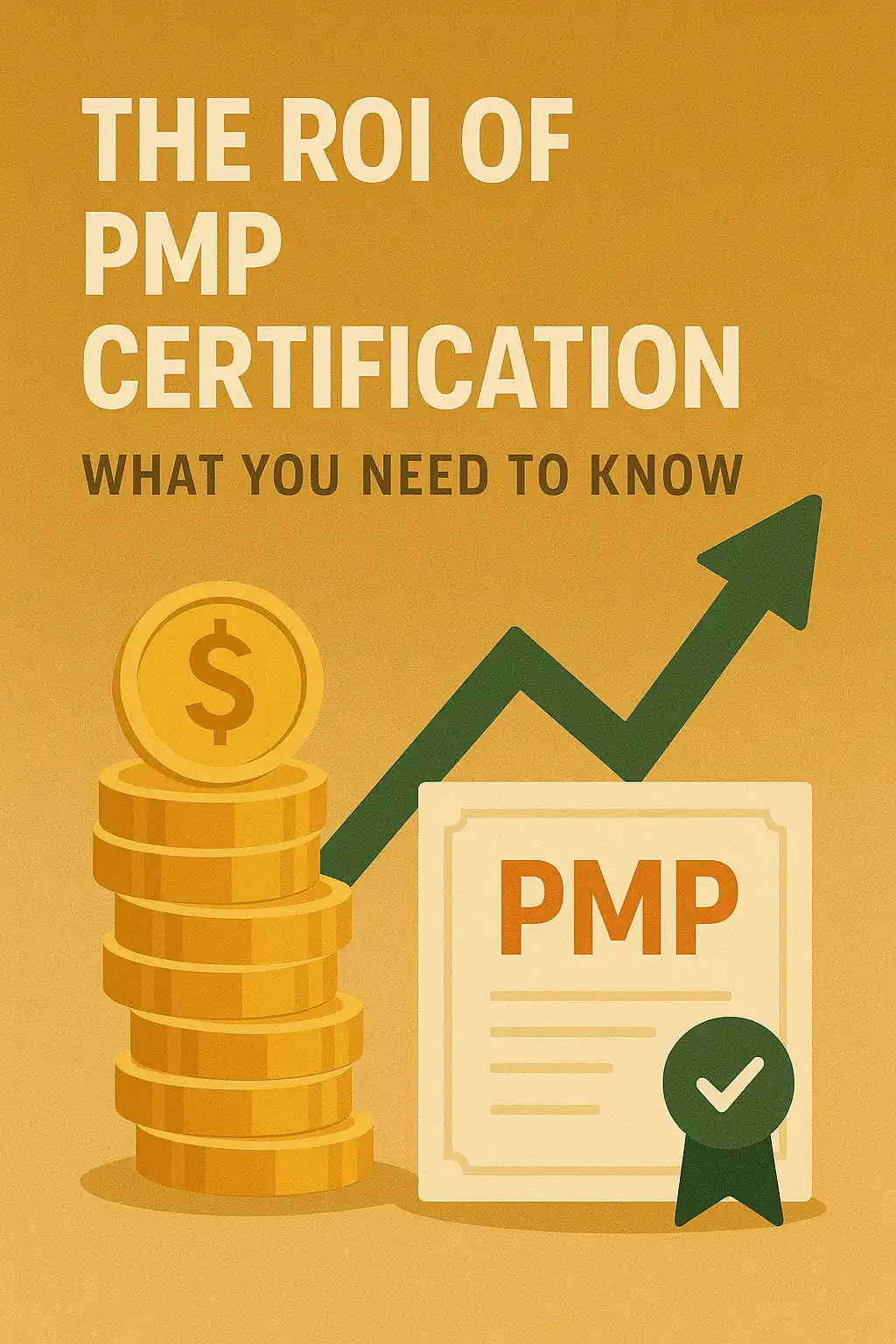Introduction
The Project Management Professional (PMP) certification stands as a globally recognized benchmark of excellence. Offered by the Project Management Institute (PMI), this certification is designed for experienced project managers who wish to validate their skills and enhance their career prospects. The PMP certification not only signifies a commitment to the profession but also equips individuals with the knowledge and tools necessary to lead projects effectively. As organizations increasingly recognize the value of structured project management, the relevance of PMP certification continues to grow, making it a focal point for professionals aiming to advance their careers in this competitive field [3][10].
When considering the investment in PMP certification, it is essential to understand the concept of Return on Investment (ROI). ROI is a financial metric used to evaluate the efficiency of an investment, calculated by comparing the benefits gained from the investment against its costs. In the context of professional certifications, ROI encompasses not only the immediate financial returns, such as salary increases, but also the long-term career benefits, including enhanced job security, career mobility, and professional recognition [8][9].
Business executives and project managers are increasingly weighing the costs associated with obtaining PMP certification against the potential benefits. With the average PMP-certified professional earning approximately 20% more than their non-certified counterparts, the financial incentive is significant [11]. Furthermore, as industries evolve and the demand for skilled project management professionals rises—projected to reach 88 million by 2027—having a PMP certification can position individuals as preferred candidates for senior roles and promotions [10]. This growing recognition of the certification’s value prompts many professionals to consider it a worthwhile investment in their future.
Understanding PMP Certification
The Project Management Professional (PMP) certification is a globally recognized credential that signifies a professional’s expertise in project management. It is administered by the Project Management Institute (PMI) and is highly regarded in various industries. Here’s a comprehensive overview of what PMP certification entails, including the process, knowledge areas, and its value in the job market.
Overview of the PMP Certification Process
- Eligibility Requirements: Candidates must meet specific educational and professional experience criteria. For those with a high school diploma, a minimum of 60 months of leading projects is required, along with 35 hours of project management education. Alternatively, candidates with a four-year degree need 36 months of project leadership experience and the same 35 hours of education [6][12].
- Application Process: After confirming eligibility, candidates must complete an application detailing their project management experience and education. This application is reviewed by PMI, and upon approval, candidates can schedule their exam.
- Exam Format: The PMP exam consists of 180 multiple-choice questions that assess a candidate’s knowledge across various project management domains. The exam is designed to test both theoretical knowledge and practical application of project management principles [9].
Knowledge Areas and Competencies Covered in PMP Training
PMP training encompasses several key knowledge areas and competencies essential for effective project management. These include:
- Integration Management: Understanding how to unify and coordinate various project elements.
- Scope Management: Defining and controlling what is included and excluded in the project.
- Schedule Management: Planning and controlling the project timeline.
- Cost Management: Estimating, budgeting, and controlling costs to keep the project within the approved budget.
- Quality Management: Ensuring that the project meets the required quality standards.
- Resource Management: Managing human and physical resources effectively.
- Communication Management: Facilitating effective communication among stakeholders.
- Risk Management: Identifying, analyzing, and responding to project risks.
- Procurement Management: Managing the acquisition of goods and services from external sources.
- Stakeholder Management: Engaging and managing relationships with all project stakeholders [10][14].
Value of Being Certified in a Competitive Job Market
In today’s competitive job market, PMP certification offers significant advantages:
- Global Recognition: PMP is one of the most recognized project management certifications worldwide, which can enhance a professional’s credibility and marketability [2][5].
- Higher Earning Potential: Certified project managers often enjoy higher salaries compared to their non-certified peers. Studies indicate that PMP holders can earn up to 22% more than those without the certification [13].
- Career Advancement: The certification can open doors to new career opportunities and roles, as many employers prefer or require PMP certification for project management positions [8][11].
- Competitive Edge: In a landscape where many candidates possess similar qualifications, PMP certification can serve as a differentiator, showcasing a commitment to the profession and a mastery of project management principles [3][4].
Costs Involved in Obtaining PMP Certification
When considering the Project Management Professional (PMP) certification, it is essential to evaluate the financial investment involved. This section provides a detailed breakdown of the various costs associated with obtaining PMP certification, helping business executives and project managers assess whether the certification is worth the investment.
Direct Costs:
- Exam Fees: The cost of the PMP certification exam is $405 for members of the Project Management Institute (PMI) and $555 for non-members. Becoming a PMI member incurs an additional fee of $129 per year, plus a one-time application fee of $10, which can significantly reduce the exam cost for members [3][7].
- Training Costs: Training for the PMP certification can range from $500 to $2,000, depending on the provider and the course’s comprehensiveness. This includes options for online courses, in-person classes, and live sessions with Q&A opportunities [4][12].
- Study Materials: Additional expenses may include purchasing study guides, books, and other preparation materials, which can vary widely in cost but should be factored into the overall budget for certification [12].
Indirect Costs:
- Time Off Work: Preparing for the PMP exam often requires taking time off work, which can lead to lost income. The amount of time needed for study varies by individual but should be considered when calculating the total investment [11].
- Study Time: The time spent studying for the exam can be substantial, with many candidates dedicating several weeks or months to preparation. This time commitment can impact work-life balance and productivity [11].
- Opportunity Costs: The opportunity cost of pursuing PMP certification includes the potential income lost while studying or attending training sessions instead of working. This is an important factor for professionals who may be forgoing work hours to prepare for the exam [11].
Potential Hidden Costs:
- Retesting: If a candidate does not pass the exam on the first attempt, they will incur additional costs for retesting. The exam fee must be paid again, which can add to the overall financial burden of obtaining certification [12].
- Recertification: PMP certification is not a one-time expense; it requires renewal every three years. The renewal cost is $60 for PMI members and $150 for non-members, which should be included in the long-term financial planning for maintaining the certification [13].
Potential Benefits of PMP Certification
Obtaining a Project Management Professional (PMP) certification can be a significant investment for professionals in the field of project management. However, the potential benefits associated with this certification often outweigh the costs, making it a strategic choice for many. Here are some key advantages that contribute to the return on investment (ROI) for PMP certification:
- Increased Earning Potential: One of the most compelling reasons to pursue PMP certification is the substantial increase in salary that certified professionals can expect. According to the Project Management Institute (PMI), individuals with a PMP certification earn, on average, 20% more than their non-certified counterparts. This statistic highlights the financial benefits that can come from obtaining the certification, making it a worthwhile investment for many project managers [5][12].
- Enhanced Job Prospects and Career Advancement Opportunities: The demand for PMP-certified professionals is high, with 71% of employers indicating a preference for candidates with this certification when hiring for project management positions. This preference translates into better job prospects and opportunities for career advancement. Organizations are increasingly keen to hire certified professionals, which can lead to more fulfilling roles and responsibilities within the industry [2][4][6].
- Improved Skills and Knowledge Leading to Better Project Performance: The PMP certification process equips professionals with a comprehensive understanding of project management principles and practices. This enhanced knowledge not only improves individual performance but also contributes to better project outcomes. Certified professionals are often better prepared to lead teams, manage resources, and navigate complex project challenges, ultimately leading to increased efficiency and success in project delivery [1][6][9].
Real-World ROI of PMP Certification
When considering the value of obtaining a Project Management Professional (PMP) certification, it is essential to analyze the tangible benefits that can significantly impact both individual careers and organizational success. Below are key points that highlight the return on investment (ROI) associated with PMP certification.
- Salary Increases Post-Certification: Research indicates that project managers who hold a PMP certification earn, on average, significantly more than their non-certified counterparts. Specifically, certified project managers can earn up to 33% more than those without the certification, showcasing a clear financial incentive for pursuing this credential [11][14]. Surveys have consistently shown that PMP certification correlates with higher salary potential, making it a worthwhile investment for professionals in the field [12].
- Case Studies of Organizational Benefits: Numerous organizations have reported enhanced project outcomes and improved efficiency after employing PMP-certified managers. For instance, companies that prioritize hiring certified project managers often experience better project delivery rates, reduced costs, and improved stakeholder satisfaction. These benefits stem from the advanced skills and methodologies that PMP-certified professionals bring to their teams, including a deeper understanding of project management frameworks such as Agile and waterfall approaches [2][3].
- Testimonials from Certified Professionals: Many certified project managers share success stories that illustrate the personal and professional growth they have experienced post-certification. For example, a PMP holder may recount how the certification not only enhanced their project management skills but also opened doors to leadership roles and increased responsibilities within their organization. These testimonials often highlight the confidence and credibility that come with being PMP certified, which can lead to greater job security and career advancement opportunities [10][5].
Long-Term Value of PMP Certification
The Project Management Professional (PMP) certification stands out as a significant investment for both individual professionals and organizations. Here, we analyze the long-term benefits and relevance of obtaining PMP certification, particularly for business executives and project managers considering the costs involved.
Lifelong Learning and Continuous Professional Development Opportunities
One of the most compelling aspects of PMP certification is its emphasis on lifelong learning. Certified PMPs are required to earn 60 professional development units (PDUs) every three years to maintain their certification. This requirement encourages ongoing education and skill enhancement, ensuring that project managers stay current with industry trends and methodologies [15]. As project management practices evolve, continuous professional development not only enhances individual capabilities but also contributes to the overall effectiveness of project teams and organizations.
The Impact of Certification on Industry Standards and Best Practices
PMP certification is recognized globally and is often seen as a benchmark for project management excellence. It helps establish a common language and set of standards within the industry, which can lead to improved project success rates. Organizations that employ PMP-certified project managers often experience better alignment with industry best practices, resulting in more efficient project execution and delivery [8][9]. This alignment not only enhances the credibility of project managers but also boosts the reputation of the organizations that hire them.
Networking Opportunities Through PMI and Other PMP Communities
Another significant benefit of PMP certification is the access it provides to a vast network of professionals. The Project Management Institute (PMI) and various PMP communities offer numerous networking opportunities, allowing certified professionals to connect with peers, share knowledge, and collaborate on projects. This networking can lead to new job opportunities, partnerships, and insights into industry trends, further enhancing the value of the certification [11]. The relationships built through these networks can be invaluable, providing support and resources that contribute to long-term career growth.
Weighing the Costs Against the Benefits
When considering the value of obtaining a Project Management Professional (PMP) certification, it is essential to analyze the return on investment (ROI) from both personal and organizational perspectives. This section aims to provide a framework for evaluating the costs against the benefits, helping business executives and project managers make informed decisions.
1. Framework for Evaluating Personal and Organizational ROI
To effectively assess the ROI of PMP certification, consider the following framework:
- Cost Analysis: Begin by calculating the total costs associated with obtaining the certification. This includes exam fees, study materials, training courses, and the time invested in preparation. Understanding these costs is crucial for determining the financial commitment required.
- Potential Earnings Increase: Research indicates that PMP certification can lead to higher salaries. According to various studies, certified project managers often earn significantly more than their non-certified counterparts. For instance, the Project Management Institute (PMI) reports that PMP holders can earn up to 20% more than those without the certification [11].
- Career Advancement Opportunities: Evaluate how PMP certification aligns with your career goals. For many professionals, obtaining this certification can open doors to advanced positions, leadership roles, and increased responsibilities. It is essential to consider how this aligns with your long-term career aspirations [15].
2. Aligning PMP with Individual Career Goals
PMP certification is not just a credential; it is a strategic career move. Reflect on the following aspects:
- Skill Enhancement: The certification process equips individuals with essential project management skills and methodologies, enhancing their ability to lead projects effectively. This skill set is increasingly valuable in today’s competitive job market [13].
- Industry Relevance: Different industries may place varying levels of importance on PMP certification. For example, sectors such as IT, construction, and healthcare often prioritize certified project managers. Assessing the relevance of PMP in your specific industry can help gauge its potential impact on your career trajectory [14].
3. Considering Industry and Job Market Conditions
The job market conditions and industry trends play a significant role in determining the value of PMP certification:
- Demand for Certified Professionals: Research the current demand for PMP-certified professionals in your industry. A strong demand can indicate that obtaining the certification may lead to better job security and opportunities for advancement [12].
- Market Trends: Stay informed about the evolving landscape of project management. Industries are increasingly adopting standardized methodologies, and PMP certification is often seen as a benchmark for project management excellence. Understanding these trends can help you make a more informed decision about pursuing certification [6].
Conclusion
In evaluating the return on investment (ROI) of obtaining a Project Management Professional (PMP) certification, it is essential to recognize both the financial and professional advantages that come with this credential.
- Financial Benefits: The ROI from PMP certification can be substantial, with estimates suggesting an increase in salary ranging from 501.8% to 550.6% in the first year alone for certified professionals. This significant financial uplift underscores the value of the certification in enhancing earning potential and career advancement opportunities [3][6].
- Professional Advantages: Beyond monetary gains, PMP certification equips project managers with essential skills that contribute to higher project success rates. Certified professionals are often better positioned to bridge functional divides, execute strategic visions, and make informed decisions under pressure, all of which are critical in today’s dynamic business environment [8][6].
However, it is crucial for prospective candidates to carefully weigh the costs associated with obtaining the certification against these potential benefits. This includes not only the financial investment in training and examination fees but also the time commitment required to prepare for the certification [9][10].
In conclusion, for business executives and project managers contemplating the value of PMP certification, a thorough analysis of personal and organizational goals is vital. By assessing the potential ROI and aligning it with career aspirations, individuals can make informed decisions about pursuing this certification. Taking the next step—whether that means enrolling in a PMP training program or seeking mentorship from certified professionals—can lead to significant professional growth and enhanced project management capabilities.
Find out more about Shaun Stoltz https://www.shaunstoltz.com/about/.
This post was written by an AI and reviewed/edited by a human.



